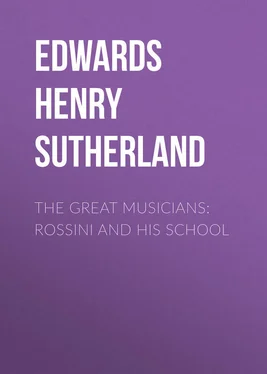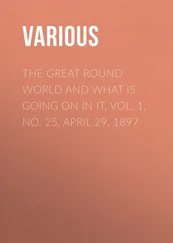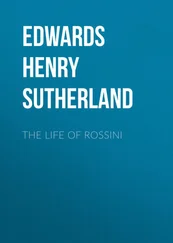Henry Edwards - The Great Musicians - Rossini and His School
Здесь есть возможность читать онлайн «Henry Edwards - The Great Musicians - Rossini and His School» — ознакомительный отрывок электронной книги совершенно бесплатно, а после прочтения отрывка купить полную версию. В некоторых случаях можно слушать аудио, скачать через торрент в формате fb2 и присутствует краткое содержание. Жанр: foreign_antique, foreign_prose, на английском языке. Описание произведения, (предисловие) а так же отзывы посетителей доступны на портале библиотеки ЛибКат.
- Название:The Great Musicians: Rossini and His School
- Автор:
- Жанр:
- Год:неизвестен
- ISBN:нет данных
- Рейтинг книги:5 / 5. Голосов: 1
-
Избранное:Добавить в избранное
- Отзывы:
-
Ваша оценка:
- 100
- 1
- 2
- 3
- 4
- 5
The Great Musicians: Rossini and His School: краткое содержание, описание и аннотация
Предлагаем к чтению аннотацию, описание, краткое содержание или предисловие (зависит от того, что написал сам автор книги «The Great Musicians: Rossini and His School»). Если вы не нашли необходимую информацию о книге — напишите в комментариях, мы постараемся отыскать её.
The Great Musicians: Rossini and His School — читать онлайн ознакомительный отрывок
Ниже представлен текст книги, разбитый по страницам. Система сохранения места последней прочитанной страницы, позволяет с удобством читать онлайн бесплатно книгу «The Great Musicians: Rossini and His School», без необходимости каждый раз заново искать на чём Вы остановились. Поставьте закладку, и сможете в любой момент перейти на страницу, на которой закончили чтение.
Интервал:
Закладка:
Madame Mombelli, moreover, had written the libretto, while the old Mombelli – once a "celebrated tenor" and still "so ambitious" as to wish to see his daughters legitimately married – had from among his plentiful reminiscences given Rossini ideas for melodies. Not only did the company, in the words of Stendhal's officer, consist of a single family; this family included, moreover, among its members, the composer himself, who was somehow related to the Mombellis.
From 1812 to 1813 was for Rossini a great step in advance; for during this latter year were produced Tancredi and L'Italiana in Algeri , works destined within a very short time to find their way all over Europe. But before producing Tancredi , Rossini began the year by bringing out a little operetta entitled Il Figlio per Azzardo .
Rossini caused in his time a great deal of trouble to managers; and if those with whom he had to deal were for the most part bald, that, he said, was to be accounted for by his having driven them repeatedly to tear their hair. Some of the directors suffered from his apparent laziness, which at most could be called dilatoriness; for that Rossini was a composer of extraordinary activity is shown by the fact that by the time he was thirty-seven he had written thirty-seven operas; while, during the period of his greatest fertility, he frequently produced as many as four operas in one year. More than once, too, he completed an opera within a fortnight; but this fortnight was usually the last and never the first of the space of time assigned to him for the composition of a given work. Sometimes, however, he was annoyed and worried by managers without sufficient cause; and in these cases he knew how to retaliate. The manager of the San Mosè theatre, that Marquis Cavalli who also directed the theatre of Sinigaglia, and who, as already mentioned, had given Rossini his first commission, thought that having begun by writing for the San Mosè, the young composer ought not to work for any other theatre at Venice. He had engaged, however, to write an opera for the Fenice, where Tancredi was destined to be brought out; and the Marquis was so annoyed at this that he treated Rossini on more than one occasion with absolute incivility. He had supplied him, moreover, with a libretto so monstrously absurd that it was impossible to treat it seriously, or even in the spirit of mere comedy. Rossini, however, had to choose between setting this nonsense to music or paying a fine; and he preferred the former alternative. The task he now set himself was to compose to his ridiculous libretto music more ridiculous even than the words. Tenor music was given to the bass, who, to execute it, had to shout at the top of his voice. The soprano, on the other hand, had been furnished with a contralto part, which made demands only upon the lowest notes of her voice. A singer of notorious-incompetence was provided with a most difficult air, accompanied pianissimo , so that his faults might at least not be concealed. Another singer, whose burlesque appearance never failed to throw the house into convulsions, had to sing a sentimental melody of the most lackadaisical kind. The orchestration was quite as remarkable as the writing for the voices. One of Rossini's great merits consists in his having introduced new instruments into the operatic orchestra of his time; and in scoring Il Figlio per Azzardo , he wrote parts for instruments of percussion never before and probably never afterwards employed. These were the tin-shades of the candles with which the desks of the players were furnished, and which, in one movement, had to be struck at the beginning of each bar. For a time the public smiled at Rossini's pleasantry, until at last it occurred to some one that the composer was taking liberties with his audience. Then hoots and hisses were heard from every part of the theatre, and the end of Rossini's practical joke was that the practical joker had to rush from his post at the head of the orchestra and seek safety in flight.
CHAPTER III.
ITALIAN OPERA UNTIL THE TIME OF ROSSINI
Tancredi was Rossini's first serious opera, and the first opera by which his name became known throughout Europe. In this work, too, we find indicated, if not fully carried out, all those changes in the composition of the lyric drama which, without absolutely inventing them, he introduced from Germany, and especially from Mozart's operas, into Italy.
It seems strange, what was nevertheless the case, that when Rossini began to write, the mere forms of the lyric drama were, in Italy at least, far from being looked upon as settled. Opera could not at that time boast a history of more than about two centuries, and though it had made great progress during the previous hundred years and was scarcely the same entertainment as that which the most illustrious nobles in Italy had taken under their protection in the early part of the seventeenth century, it was still far from resembling the opera of the present day; so much more developed, so much more elaborated.
No general view of the progress of operatic art in Europe can well be taken; for its advance has been different in each country. But its progress in Italy was sufficiently regular from its birth, or rather its invention, towards the end of the sixteenth century up to the period of Scarlatti; and from Scarlatti in a continuous line to Rossini.
Without going back to the origin of music in general, it may not be inappropriate, in connection with Rossini's innovations, and with a view to these innovations being better understood, to sketch in the briefest manner the history of the musical drama in Italy from its deliberate invention until, after its various developments, it became what Rossini made it between the years 1813, the year in which Tancredi was brought out, and 1823, the date of the production of Semiramide .
The opera, so far as a natural origin can be claimed for it at all, proceeds from the sacred musical plays of the fifteenth and sixteenth centuries, as the modern drama proceeds from the so-called mysteries of the same period. Indeed the earliest musical dramas of modern Italy, from which the opera of the present day is directly descended, were mysteries differing only from the dramatic mysteries in having been written for the singing, not for the speaking voice. The opera, or drama in music, is not, compared with the spoken drama, a very ancient form of art. Persons afflicted with a rage for seeking in the distant past traces and origins of a form of art which was created and forced into existence in comparatively modern times, see the first specimens of opera in the Greek plays; a view which will be worth considering when writers on the subject of Greek music have come to an understanding as to its exact nature. One thing is quite certain, that the Greek plays are remembered solely by what musicians call the "words," whereas, with the exception of Herr Wagner's highly poetical, highly dramatic works, there are no operas written to be performed throughout in music, which, by their words alone, would have the least chance of living. Nor did the musical mysteries or musical plays of the fifteenth century – which were partly declaimed, partly sung, and always by solo voices – bear any great resemblance to the grand operas of the present day with their airs, duets, concerted pieces, and elaborate dramatic finales, supported by an orchestra which is always being varied and reinforced through the addition of new instruments, and in which composers aim constantly at the formation of new instrumental combinations. Of course, too, the sacred musical plays of the fifteenth century differed from our modern operas by their subjects. A primitive sort of opera on the Conversion of St. Paul , which was performed throughout in music at Rome in 1440, is not the sort of work that would be likely to interest our modern audiences, who entertain a marked preference for operas in which a leading part is assigned to the prima donna, and who have no objection to the prima donna's representing a thoroughly mundane character, such as the fascinating Carmen, in the late M. Bizet's opera of that name, or the less fascinating Violetta, in Verdi's Traviata .
Читать дальшеИнтервал:
Закладка:
Похожие книги на «The Great Musicians: Rossini and His School»
Представляем Вашему вниманию похожие книги на «The Great Musicians: Rossini and His School» списком для выбора. Мы отобрали схожую по названию и смыслу литературу в надежде предоставить читателям больше вариантов отыскать новые, интересные, ещё непрочитанные произведения.
Обсуждение, отзывы о книге «The Great Musicians: Rossini and His School» и просто собственные мнения читателей. Оставьте ваши комментарии, напишите, что Вы думаете о произведении, его смысле или главных героях. Укажите что конкретно понравилось, а что нет, и почему Вы так считаете.












